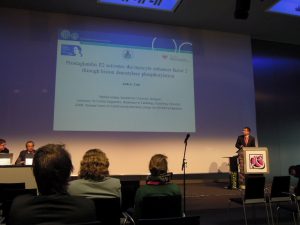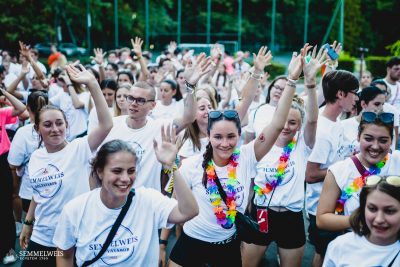Five questions – five answers: in our new series of interviews, we ask former scholarship students about their experiences, about the role of the scholarship in their careers, and above all what they advise to future scholarship students. Dr. András Tóth conducted research for 10 months with the Jellinek Harry Scholarship Program at the Department of Cardiology in Heidelberg. He currently works at the 3rd Department of Internal Medicine.
 Name: Dr. András Tóth
Name: Dr. András Tóth
Faculty: Faculty of Medicine
Scholarship name: Jellinek Harry Scholarship (10 months)
Receiving institution: Heidelberg University, Department of Cardiology, Molecular Cardiology and Epigenetics, Johannes Backs’s working group
Current workplace: Semmelweis University, 3rd Department of Internal Medicine
Why did you choose this institution? What were you working on during the programme?
Prior to the program, I was working in the frame of the Students’ Scientific Association at the Department of Physiology, under the supervision of Dean László Hunyady. I was examining the topic of regulating plasma membrane receptors and their signal transmission. I heard about the scholarship from Dr. Ákos Lőrincz, who studied signal transmission pathways at the Institute Pharmacology of Heidelberg University, under the mentorship of Professor Thomas Wieland. After hearing about Ákos’ excellent experiences, I also got a taste for the programme, and I applied to the same lab. However, due to a change in the rules at that time, I had to do research at the Heidelberg Medical Faculty, and as a researcher of signal transmission processes of myocardial cells, I went to Dr. Johannes Backs’ laboratory at the Department of Cardiology of Heidelberg University. He saw a great opportunity in my research project and initiated a collaboration with Professor Wieland’s lab. Within the framework of the collaboration I was given a completely new research direction. My task was to map not yet known new pathways of epigenetic control mechanisms of the heart from plasma membrane receptors. I was really honoured by this task, especially in the light of the fact that I could work on it at the clinic headed by Professor Hugo Katus, who is the discoverer of the use of troponin as a diagnostic marker. I believe that their confidence about me taking on this responsibility was due to two things: several years of research experience at the Students’ Scientific Association and knowing that there were previous Semmelweis students whose extraordinary performances had always been satisfactory.
What was the most defining experience during the scholarship?
I had countless unforgettable experiences during the journey; it would be difficult to choose only one of them. Overall, I was the most thrilled to work at one of the best universities on the continent. The result-centric work was also combined with a flexible work environment. On the campus, everything is accessible by bicycle or even on foot within minutes, and the dormitories are also located next to the campus. There is a vibrant intellectual life at the university, with many entertainment possibilities nearby. We often had a meeting with colleagues after work while having a good cold German beer. These occasions included both socializing and the discussion of new ideas, so I could continuously gain inspiration for successful research.
How did the scholarship period help you in your life and career?
Thanks to the intensive research work of the time spent in Heidelberg, we succeeded in identifying a so far unknown inflammatory signal pathway leading to the characteristic maladaptive gene expression changes in heart failure. They wanted to continue working on this promising topic, so the nature of the common work changed: instead of carrying out the experiments, my task was planning, and their results were continuously discussed online. The work was so fruitful that the results were published in the prestigious EMBO Molecular Medicine scientific journal. In addition to the publication, I had the opportunity to present our results as an invited speaker at the Meeting of the Heart Failure Association of the European Society of Cardiology in Switzerland as well as at the annual congress of the German Cardiac Society in Mannheim. In addition to these, I consider it an important positive achievement that my research work in Germany taught me autonomy, which helped me get over the obstacles of my PhD research in Hungary much more easily. I have also made a lot of new friends in the lab. The parties, big chats or barbecues by the Neckar are unforgettable experiences. Several friendships have lasted to this day, and many of them have visited me here in Budapest and also welcomed me in their homes.
What advice would you give to outgoing Semmelweis students?
If you have not decided yet, I sincerely recommend that you apply because you can gain so much with this opportunity. The only negative thing is that you complete your studies one year later, but compared to all the advantages, it is minuscule. Furthermore, this one year is a particularly valuable experience and can become one of the most defining periods in your life. If you are interested in research and willing to work hard, do not hesitate and take advantage of this opportunity! And when you have started, put your heart and soul into it to get the most out of the scholarship period.
What do you think those who go to Heidelberg with a scholarship should not miss?
The Vetter and the view of Heidelberg in summer from Phylosophenweg!
Source: Directorate of International Relations
Translation: Diána Módos


